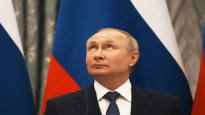Intelligence does not confirm Russia’s claim that the troops will withdraw, writes ‘s foreign journalist Mika Mäkeläinen.
The question of the fate of Europe is whether the Russian president wants to Vladimir Putin to attack Ukraine again, more brutally and even deeper.
Not to be forgotten, Russia has been occupying part of Ukraine for eight years soon. It first took over the Crimean peninsula in February 2014 and then staged a war in eastern Ukraine more than 14,000 people (switch to another service).
In connection with the conquest of Crimea, Putin denied that the “little green men” were Russian soldiers. Only after Russia had consolidated its power did Putin confessed (moving to another service) soldiers as their own.
This time, Putin denies that the troops assembled near the Ukrainian border are intending to attack.
It suddenly sounds promising.
However, history has taughtthat the Kremlin’s intentions should be interpreted on the basis of deeds rather than words.
So what is Russia doing now on the Russian-Ukrainian border? Russia claims one and intelligence tells another.
On the contrary, according to public satellite imagery, Russia is deploying its troops suitable for the attack in ever newer areas near the border.
Putin’s intentions can also be created based on how he himself has prepared for the consequences of the war.
All this does not mean that Russia will necessarily attack Ukraine.
Instead, Russia’s actions mean it can quickly decide on an attack. Full readiness to attack is also a means of political pressure on Russia.
So Russia is playing poker at the highest possible stakes.
It’s not a bad thing to check also how American speeches and actions are in line. When the United States warns strongly about the threat of an immediate attack by Russia, do its own actions reflect belief in its own claim?
Based on the information available to the public, the answer is yes.
The details of the evacuation have been revealed to show that the United States is very serious: the US State Department has ordered the destruction of the embassy’s computers and messaging systems; says The Wall Street Journal (moving to another service). After that, the delegation can no longer be used.
The risk of the US delegation falling into the hands of Russia is therefore considered to be such that its most valuable assets should be destroyed immediately.
Like the Finns who lost their homeland in the Winter War, who, after retreating from Karelia, preferred to burn their homes rather than give a red house to the Red Army.
However, the difference is clear: the United States is burning bridges behind it even before the first shots have been fired.
So the United States trusts completely intelligence about Russia’s intentions to attack – or at least wants to give a complete picture of its confidence.
If nothing militarily decisive happens yet tomorrow Wednesday, Russia will lament the United States for spreading false intelligence.
If Russia really was going to attack Ukraine on Wednesday, one could well imagine that it would be worth postponing the attack just to embarrass the United States.
